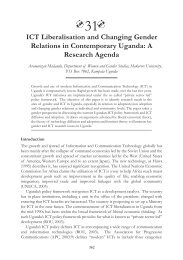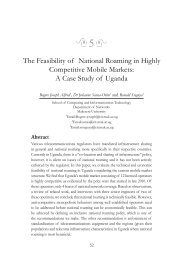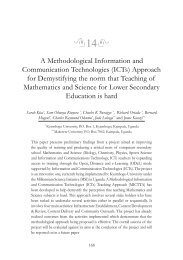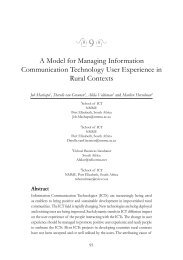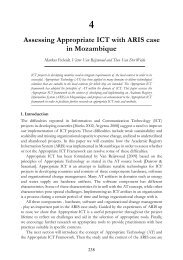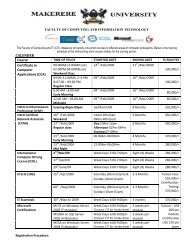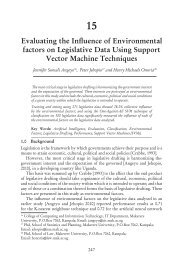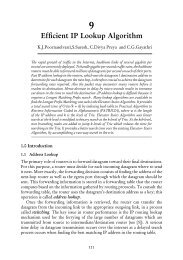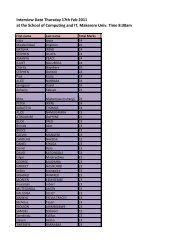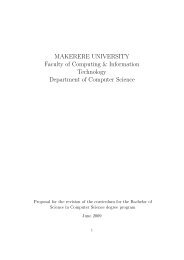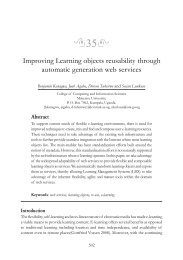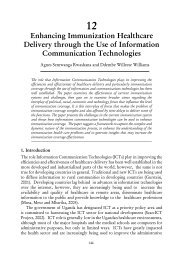John Matovu Aminah Zawedde Das Pamela and Herbert Ruhunde.pdf
John Matovu Aminah Zawedde Das Pamela and Herbert Ruhunde.pdf
John Matovu Aminah Zawedde Das Pamela and Herbert Ruhunde.pdf
You also want an ePaper? Increase the reach of your titles
YUMPU automatically turns print PDFs into web optimized ePapers that Google loves.
56 Strengthening the Role of ICT in Development Volume VIII<br />
could in the past only communicate via faxes, telegrams <strong>and</strong> postal mails. In the<br />
case of research, doing research in the past was time consuming <strong>and</strong> quite a lengthy<br />
process. Communicating with research stakeholders or sources was also a time<br />
consuming process [R<strong>and</strong>all, 1996]. The advent of computers <strong>and</strong> particularly<br />
Internet meant that it has become easier for journalists to research stories online<br />
<strong>and</strong> to also reach sources making news online [R<strong>and</strong>all, 1996]. The challenge is<br />
for journalists to identify authentic websites because as more <strong>and</strong> more people are<br />
publishing on desktop, journalists run the risk of being trapped in the information<br />
glut. In other words, where journalists cannot verify the authenticity of particular<br />
sinister websites, they will run the risk of misinforming their readers, thus losing<br />
credibility.<br />
Where there are no guidelines for good journalism practice in online journalism<br />
operations, information communication technologies will erode the ethics of<br />
journalism. Online journalists need to apply the ethics of journalism online.<br />
Applying such ethics in an online journalism environment seems to be a daunting<br />
challenge facing online journalism operations. Bradley Osborn noted in his research<br />
paper “Ethics <strong>and</strong> Credibility in Online Journalism” that the immediacy brought<br />
by the online environment, a medium which everyone is a potential publisher,<br />
allows for even less deliberation by the journalist <strong>and</strong> editor. Osborn argues “online<br />
journalists have received little or no attention from researchers, perhaps few , pure<br />
online journalistic efforts exist, compared to the wealth of trivia, entertainment,<br />
personal communication <strong>and</strong> pornography” [Osborn, 2001]. It is important to<br />
note that Osborn’s argument in this regard suggests that journalists should strictly<br />
adhere to the ethical code of journalism practice especially because the public is<br />
losing trust in journalism.<br />
Another most important role of ICTs in journalism is content management<br />
systems which allow for journalism operations to manage information <strong>and</strong><br />
knowledge effi ciently. Content management systems <strong>and</strong> knowledge management<br />
systems can be used interchangeably. There is no universal st<strong>and</strong>ard defi nition<br />
of knowledge management but generally it refers to techniques which can be<br />
applied for the systematic collection, transfer, security <strong>and</strong> management of<br />
information within organizations [Ahiabenu, 2007]. ICTs have the ability to<br />
facilitate knowledge management in the newsrooms. Ahiabenu [2007] identifi ed<br />
strategies for knowledge management using technology as; developing a mission<br />
statement for news organizations <strong>and</strong> creating a resource of useful information<br />
<strong>and</strong> knowledge easily available on dem<strong>and</strong> to all newsroom staff.<br />
To effi ciently set up an online knowledge management resource centre,<br />
Ahiabenu [2007] suggests that newsrooms should identify the types of knowledge<br />
management systems relevant to their news operation such as copy archive,<br />
commercial databases, databases of experts in specialist areas, wikis, intranet,<br />
Wires, <strong>and</strong> content routing software. It is apparent that the implementation of<br />
ICTs in journalism such as knowledge management systems driven by technology<br />
will save the journalism operation not only information but the costs for research,



